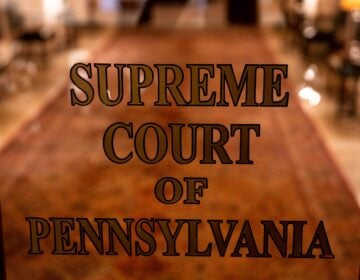Pa. Supreme Court to hear arguments Wednesday over redactions in clergy sex abuse report
Listen 1:21
A parishioner celebrates communion at the Cathedral Church of Saint Patrick in Harrisburg, Pa., Friday, Aug. 17, 2018. (Matt Rourke/AP Photo)
On Wednesday, the Pennsylvania Supreme Court will weigh arguments over redactions in the explosive grand jury report that exposed alleged widespread child sexual abuse and cover up in six of the state’s eight Roman Catholic Dioceses.
About a dozen clergy members — whose names have been redacted from the report — are fighting to protect their identities and reputations, claiming their due process rights have been violated. They argue the court should adopt the redacted version as the final draft.
Pennsylvania’s Attorney General Josh Shapiro disagrees with that conclusion. He claims the court can reconcile both the privacy rights of clergy members and the public’s interest in the investigation.
One option, Shapiro suggests, is for the court to recall the grand jury or to bring the investigation before a new grand jury to resolve objections. In addition, he says the anonymous clergy members should have the opportunity to testify before the grand jury, and that investigators should be able to bring in new evidence.
The nearly 900-page report documents the stories of more than 1,000 children who have been allegedly abused at the hands of more than 300 “predator priests.”
Since the report was released last month, the Pennsylvania Attorney General’s office has received more than 1,100 calls to it’s clergy sex abuse hotline and several other state’s attorneys general have initiated their own investigations.
As an onlooker, David Rudovsky, a civil rights attorney, says, generally, secrecy and protecting a person from unfair stigma is important in grand jury investigations, but this is an unusual case.
“You can understand why the people who may have been named feel strongly that their names should not be disclosed,” he said. “On the other hand, you can understand why the Attorney General believes that this was such widespread corruption that it’s important for the public to know everything about it.”
Rudovsky added that the public interest in the case makes it a tough decision for the court.
“I think it makes it more difficult for the court to find the right place to draw the line between public disclosure and the right of privacy, and beyond privacy, the right of individuals who might be named in the grand jury probe, but don’t have an effective way of defending themselves.”
In legal documents, attorneys representing the clergy members criticized Shapiro, personally, for his media appearances. They say he’s tainted the process.
“The Attorney General’s misconduct itself rises to the level of a violation of due process, creating a fixed bias and hostility toward the Petitioners, ensuring that no future grand juror could impartially evaluate Petitioners’ evidence in a new proceeding,” wrote the clergy’s attorneys.
In its response, the attorney general’s office brushed aside the claim, pointing out that juries have remained impartial in many other high profile cases involving intense media scrutiny including the criminal trial of his predecessor, Kathleen Kane, and of comedian and entertainer Bill Cosby.
They say the clergy members have pivoted from their original arguments over the redactions.
“The clergy-petitioners have maintained that their goal was a forum in which to challenge the grand jury’s conclusions. Now, it appears, that is not the case; the relief they desire is not more process, but no more,” wrote the Attorney General.
Terry McKiernan, president of BishopAccountability.org, has been archiving and documenting investigations into Catholic clergy sexual abuse since 2003, sparked by the scandal in Boston.
He’s says the Catholic Church has a long track record when it come to resisting transparency and accountability, but that most other reports into clergy sexual abuse don’t have redactions made by a court like this one.
“I think it’s important to remember that the Grand Jury Act in Pennsylvania provides for responses, but it does not provide for censoring of a report,” said McKiernan.
He hopes the court will decide to remove the redactions.
Oral arguments will be held in Philadelphia and will be the first public hearing before the state Supreme Court in this investigation.
WHYY is your source for fact-based, in-depth journalism and information. As a nonprofit organization, we rely on financial support from readers like you. Please give today.





